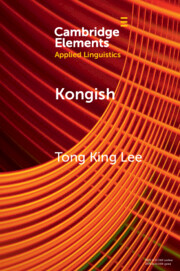Element contents
Kongish
Published online by Cambridge University Press: 11 November 2022
Summary
- Type
- Element
- Information
- Series: Elements in Applied LinguisticsOnline ISBN: 9781009281126Publisher: Cambridge University PressPrint publication: 01 December 2022
References
- 8
- Cited by



